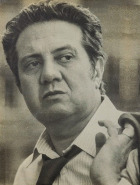

Mário Soares was born in Lisbon in 1924, the son of João Lopes Soares, a Civil Governor, MP , and Minister of the Colonies during the First Republic, and Elisa Nobre Baptista. He attended the Colégio Moderno , founded and administered by his parents, where many intellectuals opposed to the regime found work as teachers. In addition to his family, the guidance of tutors closely connected to his father played an important role in his education, ranging from followers of António Sérgio's philosophy ( sergianos ) and secular Seara Nova intellectuals such as Álvaro Salema and Agostinho da Silva to communists like Álvaro Cunhal. From an early age, Soares recount ed the influence of republican values in his environment, which were further reinforced by national and international events. He often highlighted the impact of the Spanish Civil War, referring to the martyrdom of republicans and the threat posed by Nazism and fascism. According to him, it was from this point that he transitioned from being a republican to an anti-fascist “without ceasing to be a die-hard republican” ( Um político assume-se. Ensaio autobiográfico, político e ideológico [A Politician Comes Forward: An Autobiographical, Political, and Ideological Essay], 2011, pp. 33).
His time at the Faculty of Arts of Lisbon, pursuing a degree in Histor y and Philosoph y of Science (1942–1951), was his first university experience. It was also a period defined by intense activism and the assertion of his political ideals. He quickly became acquainted with communists in the faculty, including young figures such as Jorge Borges de Macedo, Fernando Piteira Santos, and Joaquim Barradas de Carvalho, as well as non-communist oppositionists like Joel Serrão and Rui Grácio. These academic interactions allowed him to deepen his political convictions. He also encountered professors who opposed the regime, including José António Ferreira de Almeida and Vitorino Magalhães Godinho, under whom he studied. But he also came into contact with professors opposed to the regime, from whom he was a student, notably José António Ferreira de Almeida and Vitorino Magalhães Godinho. In fact, he even contributed to the payment of the latter's classes at the Ateneu Comercial de Lisboa after his departure from the Faculty, considering him a personal influence as well as a significant figure in the field of historiography ( Portugal Amordaçado… [Gagged Portugal …], 1974, pp. 45–47).
This work is financed by national funds through FCT - Foundation for Science and Technology, I.P, in the scope of the projects UIDB/04311/2020 and UIDP/04311/2020.
